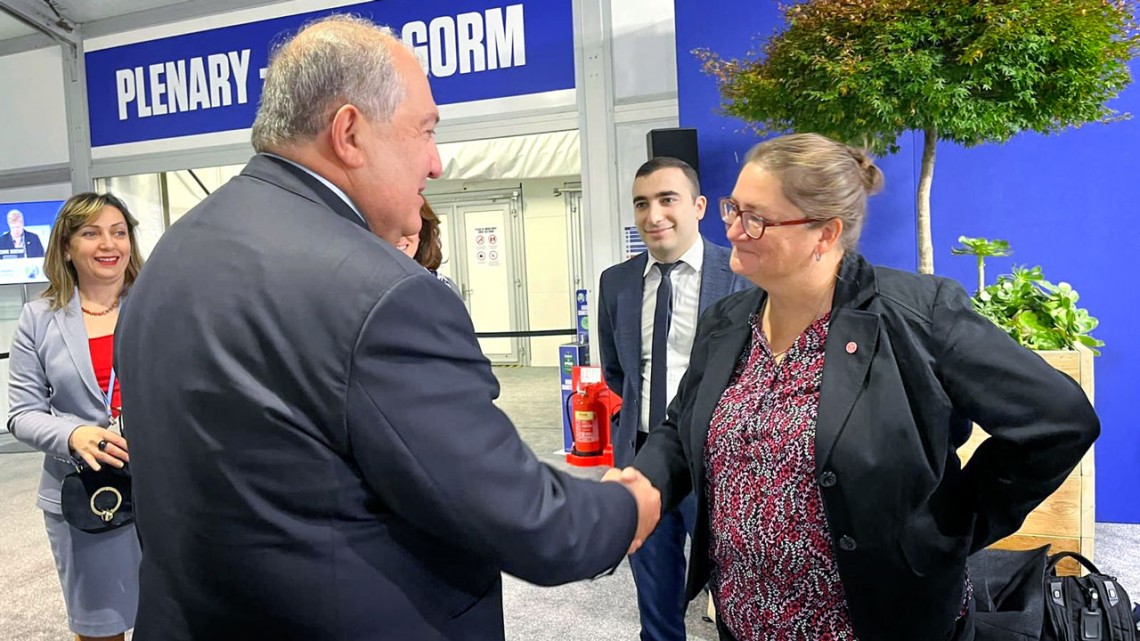
Cornell’s Allison Chatrchyan, right, greets Armen Sarkissian, the president of Armenia, on Nov. 2 at the COP26 conference in Glasgow, Scotland.
Cornell’s Chatrchyan represents Armenia at COP26 talks
By Blaine Friedlander
At the COP26 international climate change conference in Glasgow, Scotland, Cornell researcher Allison Chatrchyan gets a front row seat.
“Armenia begins with an ‘A,’ so for the large plenary meetings with all countries, Armenia is always in the first row,” said Chatrchyan, a senior research associate in the Department of Earth and Atmospheric Sciences, and Global Development. “It’s an amazing experience to sit up front at this critical global conference.”
But Chatrchyan more than sits. She works to shape United Nations policy aimed at reducing greenhouse gas emissions, and increasing carbon sequestration and adaptation through the Koronivia Joint Work on Agriculture (KJWA), a U.N. Framework Convention on Climate Change (UNFCCC) workstream formally established in Bonn, Germany, at COP23 in 2017.
Chatrchyan was one of seven Cornell researchers and partners attending the conference this week; eight more faculty will go next week. COP26 is the annual U.N. conference striving to forge ambitious agreements to avert further climate change.
The KJWA holds workshops to hear from farmers, researchers and experts from organizations like the United Nations Food and Agriculture Organization, the United Nations Development Program and the World Bank. It negotiates global policy to address soil health and fertility; water management; and nutrient and livestock management systems, in order to safeguard sustainable food systems and global food security under the UNFCCC and the Paris Agreement.
At the KJWA sessions, part of COP26, delegates from every country that is party to the 2015 Paris Agreement are sharing information on how to scale up agricultural climate change mitigation and adaptation to protect food security.
“The work that I’m doing in the KJWA process on behalf of Armenia is to make sure that their needs related to soil carbon sequestration, livestock management, agroforestry, food security, and climate change adaptation are heard at the global level,” said Chatrchyan, who gave a presentation at a KJWA workshop in December 2020 on key socioeconomic barriers that limit agricultural transformation. “And these are issues about which Cornell can provide some of the best research in the world.”
Chatrchyan’s expertise with climate change and agriculture stems from her work at Cornell, where she leads the Cornell Climate Smart Farming program with Art DeGaetano, professor in the Department of Earth and Atmospheric Sciences.
For several years, Chatrchyan and Natalie Mahowald, the Irving Porter Church Professor in Engineering, have taught Global Climate Change Science and Policy (EAS 4443/5443), a capstone course for environmental sciences majors and graduate students. Students in the class prepared in-depth policy briefs on key issues at COP26, and are following COP26 live remotely via a Cornell observer badge.
Mahowald served as a lead author of the U.N. “Special Report on Global Warming of 1.5 degrees Celsius” in 2018; Chatrchyan is involved in global negotiations to keep the world from climbing above that 1.5 C.
In the class, Cornell students learn firsthand from Mahowald and Chatrchyan about how science figures into global policymaking.
As for Armenia, the small mountainous nation that Chatrchyan represents, it is the fourth most-vulnerable country to climate change in Eastern Europe and Central Asia. It has already registered a 1.3 C increase in average temperature, and a 9% reduction in precipitation, according to Armenian government.
Reaching climate neutrality is at the core of Armenia’s energy independence, energy security and green-growth policies, President Armen Sarkissian, a physicist, said at the COP26 plenary session on Nov. 2.
Chatrchyan is taking the Armenian president’s climate commitments to heart. “When I met my Armenian colleagues at COP21 in Paris in 2015,” she said, “there were only four negotiators from the country, and it was very difficult for them to cover all the key issues being discussed.”
By working with the Cornell delegation at COP26, she is helping ensure that Armenia is at the table for critical agricultural negotiations. “I am very proud to represent Armenia at COP26,” she said, “and provide this amazing country with as much support as I can.”
Funding to organize the Cornell COP26 delegation was provided by the Cornell Atkinson Center for Sustainability.
The Department of Earth and Atmospheric Sciences is run jointly by the College of Agriculture and Life Sciences, and by the College of Engineering.
Media Contact
Get Cornell news delivered right to your inbox.
Subscribe
